外研版必修1 Module 1 My First Day at Senior High Listening and vocabulary 课件(20张PPT)
文档属性
| 名称 | 外研版必修1 Module 1 My First Day at Senior High Listening and vocabulary 课件(20张PPT) | 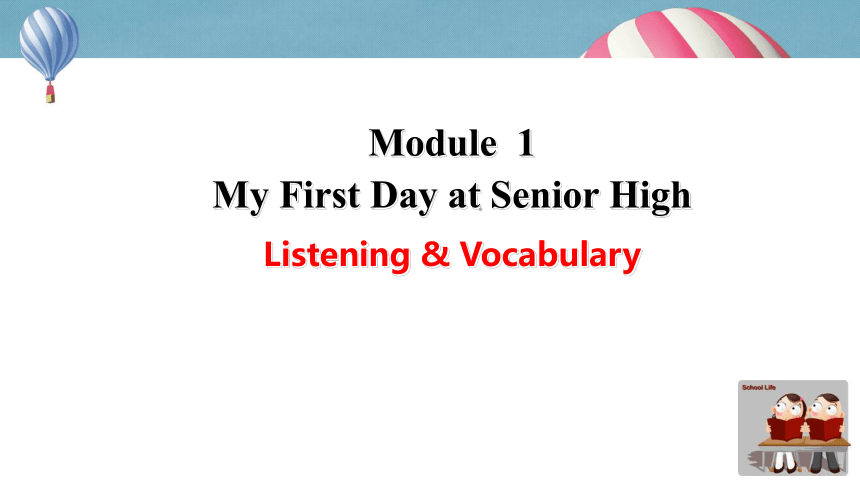 | |
| 格式 | zip | ||
| 文件大小 | 2.6MB | ||
| 资源类型 | 教案 | ||
| 版本资源 | 外研版 | ||
| 科目 | 英语 | ||
| 更新时间 | 2020-05-10 09:13:29 | ||
图片预览

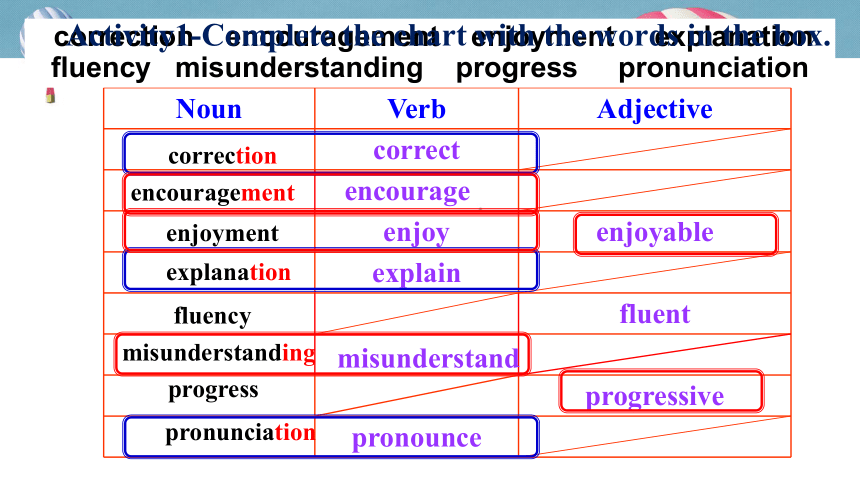
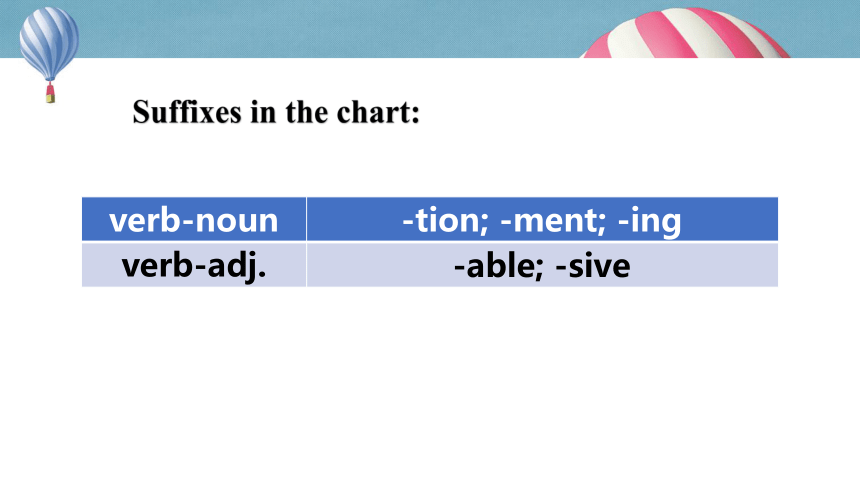
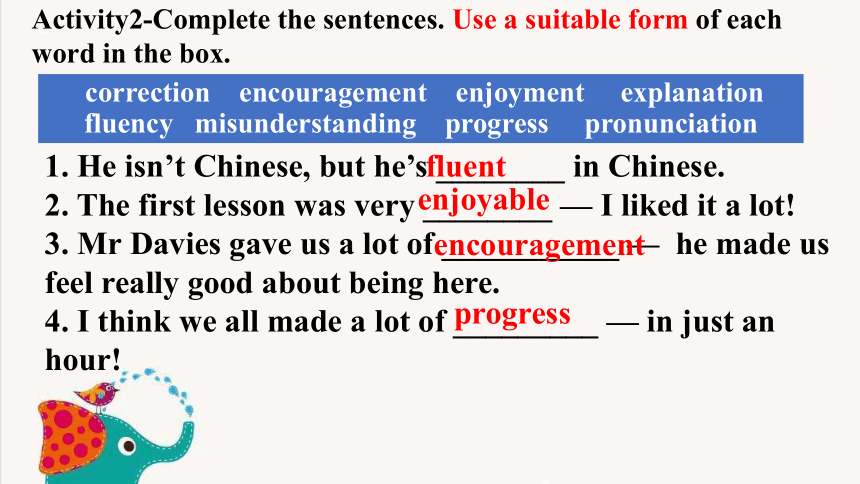
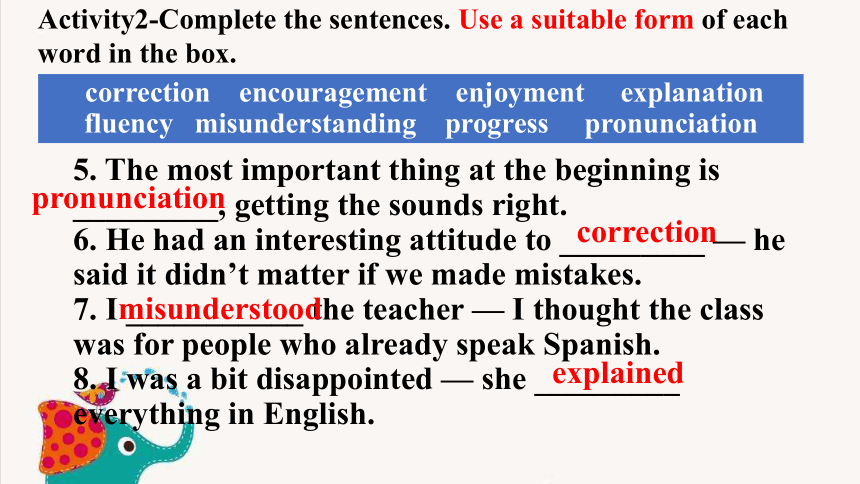
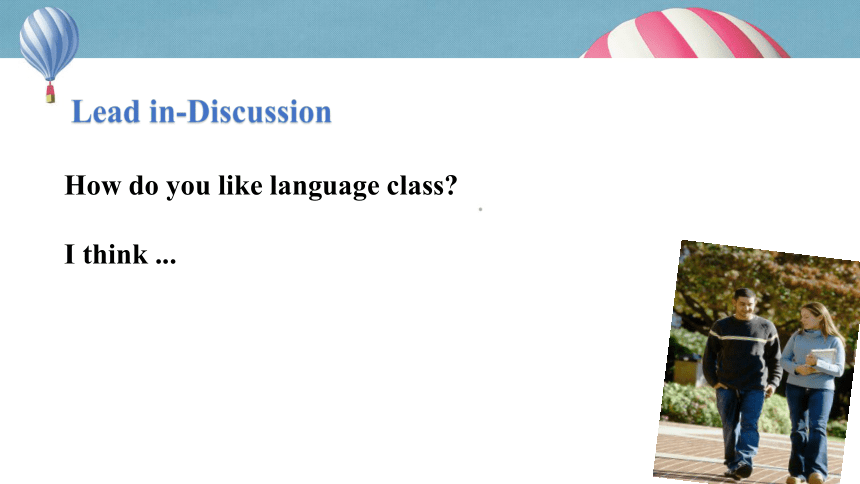
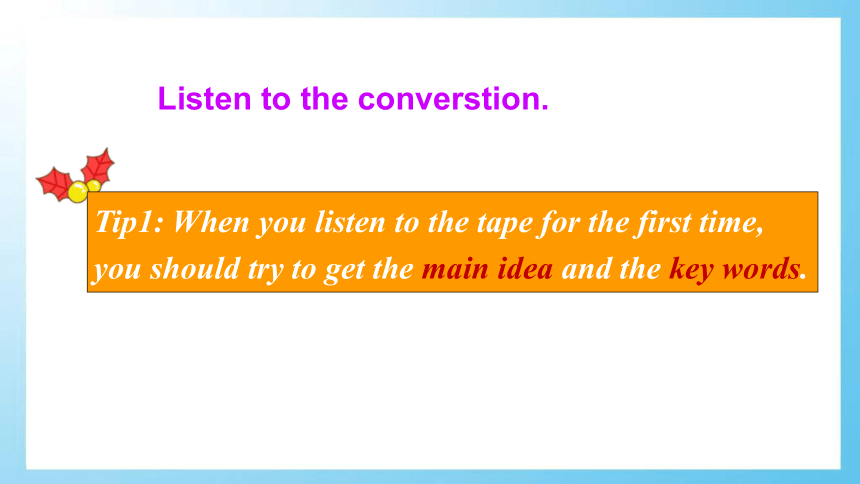
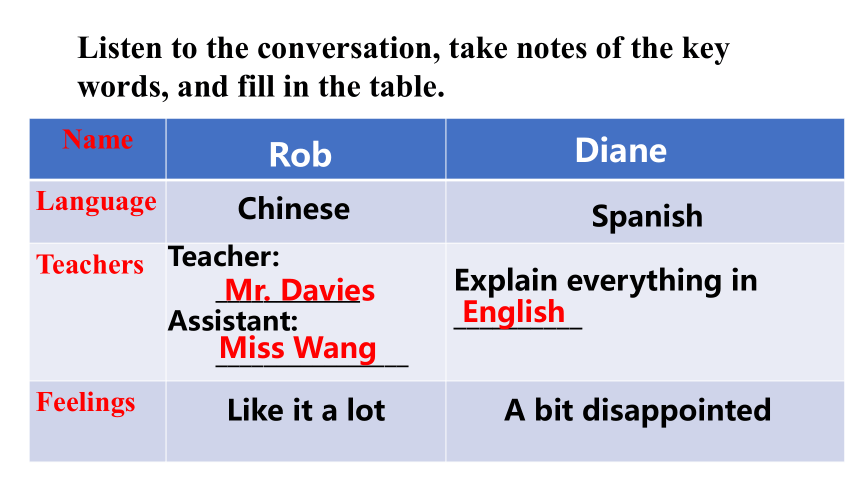

文档简介
课件20张PPT。Module 1
My First Day at Senior High
Listening & Vocabulary
correctionencouragementenjoymentexplanationfluencymisunderstandingprogresspronunciation encouragemisunderstand correction encouragement enjoyment explanation fluency misunderstanding progress pronunciationActivity1-Complete the chart with the words in the box.Suffixes in the chart:-tion; -ment; -ing -able; -sive correction encouragement enjoyment explanation fluency misunderstanding progress pronunciation1. He isn’t Chinese, but he’s ________ in Chinese.
2. The first lesson was very ________ — I liked it a lot!
3. Mr Davies gave us a lot of ___________ — he made us feel really good about being here.
4. I think we all made a lot of _________ — in just an hour!Activity2-Complete the sentences. Use a suitable form of each word in the box. fluent enjoyable encouragementprogress correction encouragement enjoyment explanation fluency misunderstanding progress pronunciationActivity2-Complete the sentences. Use a suitable form of each word in the box.5. The most important thing at the beginning is _________, getting the sounds right.
6. He had an interesting attitude to _________ — he said it didn’t matter if we made mistakes.
7. I ___________ the teacher — I thought the class was for people who already speak Spanish.
8. I was a bit disappointed — she _________ everything in English. pronunciation correctionmisunderstoodexplainedLead in-DiscussionHow do you like language class?
I think ...Listen to the converstion.Tip1: When you listen to the tape for the first time, you should try to get the main idea and the key words.ChineseSpanishTeacher:
____________
Assistant:
________________Explain everything in __________Like it a lotA bit disappointedListen to the conversation, take notes of the key words, and fill in the table.EnglishMr. DaviesMiss Wang RobDianeActivity3-Answer the following questions according to the conversaton.1. What do you think the students are doing?
They’re talking about a Chinese lesson that they both attended.
B. They’re talking about a Chinese lesson that one of them attended.
C. They’re talking about different language lessons that they attended.
2. What do you think about the lessons they attended?
A. They were both happy with their lessons.
B. They were both disappointed with their lessons.
C. One was happy but the other was disappointed.
Listen again and answer these questions.Tip2: When you listen to the tape for the second time, you should try to get the details.1. Is Diane studying Chinese?
No, she isn’t. She’s studying Spanish.
2. Is Rob’s teacher a native speaker of Chinese?
No, he isn’t, but he’s fluent in Chinese.
3. Is the assistant teacher a native speaker?
Yes, she is. Her name’s Miss Wang. 4. Did the Chinese teacher encourage the students?
Yes, he did. He made them feel really good.
5. Did he give the students anything to read?
No, he didn’t. He said pronunciation was the most important thing at the beginning. 6. Did Diane understand the level of the class she went to?
No, she didn’t. She thought it was for speakers of Spanish.
7. Was Rob disappointed with his first lesson?
No, he wasn’t. He made a lot of progress.8. Was Diane excited about her first lesson?
No, she wasn’t. She was disappointed.R: Hi, Diane!
D: Hi, Rob! How are you doing?
R: I’m fine. I’ve just been to my __1___
language class.
D: Oh really? ___ __2__ __.
R: Really? Which language are you ____3____?
D: ____4___. Which language are you studying? studyingSo have IfirstSpanishRob=R Diane=DListen to the conversation again and fill in the blanks. Pay attention to the italics(斜体字).R: Chinese.
D: Is that right? Cool! _____ _5__ ___?
R: It was good. The teacher’s name is Mr. Davies.
D: Mr. Davies?
R: Yes, he isn’t Chinese, ____6____, but he’s ___7___ in Chinese. And there’s an assistant teacher called Miss Wang. She is Chinese. We’re going to see her _____ _8_ _____. obviouslya weekfluentonceHow was itD: And what do you think?
R: Well, learning Chinese isn’t going to be __9__ — but the first lesson was very enjoyable — I liked it a lot. Mr. Davies gave us a lot of encouragement — he made us ____ __10___ ____ about being there. The most important thing at the beginning is ____11_______, getting the sounds right — and he was very good ateasyfeel really goodpronunciationcorrection — he said it didn’t matter if we _____ __12____. I think we all made a lot of progress — in just an hour!
D: That’s great.
R: What about Spanish? Did you __13__yet?
D: Yes, we did. The teacher is _14__, but
I already speak some Spanish and the rest of the class are really __15_____. made mistakesstartbeginnersniceI misunderstood the teacher — I thought she said the class was ____ _16___ who already speak Spanish. I’m not sure if I’m going to _____ _17___ progress.
R: Oh, I’m sure things will improve.
D: Maybe — actually, I was a bit _____18____ she explained everything in English.
R: Oh, that’s ___ _19_.disappointedmake muchfor peopletoo bad Everyday English and FunctionWork in pairs, choose the suitable expression to complete the conversation.--Hi, David. ________________?
--___________.
--I’m now learning Chinese.
--So am I . I have studied it for three years.
--Oh really? ____________. How do you feel?
--Cool!
-- But Chinese is not easy to learn. ______________?
--Maybe, at the beginning. But it will change.
-- _____________?
-- I’m sure things will improve.A: I'm fine.
B: Is that right?
C: How are you doing?
D: That's great.
E: And what do you think?CADEBHomework
1. Fill the blanks using the words in activity1, page5.
Emma thinks ______________(发音) and __________(流利) are highly important. She also holds the view that ______________(改正) is a major part of _____________________(取得进步). Whenever there is a _________________(误解) of a new word, there will be an English _______________ (解释). We find great _____________(乐趣) in the English class.
2. Revise what we have learned in the class.
My First Day at Senior High
Listening & Vocabulary
correctionencouragementenjoymentexplanationfluencymisunderstandingprogresspronunciation encouragemisunderstand correction encouragement enjoyment explanation fluency misunderstanding progress pronunciationActivity1-Complete the chart with the words in the box.Suffixes in the chart:-tion; -ment; -ing -able; -sive correction encouragement enjoyment explanation fluency misunderstanding progress pronunciation1. He isn’t Chinese, but he’s ________ in Chinese.
2. The first lesson was very ________ — I liked it a lot!
3. Mr Davies gave us a lot of ___________ — he made us feel really good about being here.
4. I think we all made a lot of _________ — in just an hour!Activity2-Complete the sentences. Use a suitable form of each word in the box. fluent enjoyable encouragementprogress correction encouragement enjoyment explanation fluency misunderstanding progress pronunciationActivity2-Complete the sentences. Use a suitable form of each word in the box.5. The most important thing at the beginning is _________, getting the sounds right.
6. He had an interesting attitude to _________ — he said it didn’t matter if we made mistakes.
7. I ___________ the teacher — I thought the class was for people who already speak Spanish.
8. I was a bit disappointed — she _________ everything in English. pronunciation correctionmisunderstoodexplainedLead in-DiscussionHow do you like language class?
I think ...Listen to the converstion.Tip1: When you listen to the tape for the first time, you should try to get the main idea and the key words.ChineseSpanishTeacher:
____________
Assistant:
________________Explain everything in __________Like it a lotA bit disappointedListen to the conversation, take notes of the key words, and fill in the table.EnglishMr. DaviesMiss Wang RobDianeActivity3-Answer the following questions according to the conversaton.1. What do you think the students are doing?
They’re talking about a Chinese lesson that they both attended.
B. They’re talking about a Chinese lesson that one of them attended.
C. They’re talking about different language lessons that they attended.
2. What do you think about the lessons they attended?
A. They were both happy with their lessons.
B. They were both disappointed with their lessons.
C. One was happy but the other was disappointed.
Listen again and answer these questions.Tip2: When you listen to the tape for the second time, you should try to get the details.1. Is Diane studying Chinese?
No, she isn’t. She’s studying Spanish.
2. Is Rob’s teacher a native speaker of Chinese?
No, he isn’t, but he’s fluent in Chinese.
3. Is the assistant teacher a native speaker?
Yes, she is. Her name’s Miss Wang. 4. Did the Chinese teacher encourage the students?
Yes, he did. He made them feel really good.
5. Did he give the students anything to read?
No, he didn’t. He said pronunciation was the most important thing at the beginning. 6. Did Diane understand the level of the class she went to?
No, she didn’t. She thought it was for speakers of Spanish.
7. Was Rob disappointed with his first lesson?
No, he wasn’t. He made a lot of progress.8. Was Diane excited about her first lesson?
No, she wasn’t. She was disappointed.R: Hi, Diane!
D: Hi, Rob! How are you doing?
R: I’m fine. I’ve just been to my __1___
language class.
D: Oh really? ___ __2__ __.
R: Really? Which language are you ____3____?
D: ____4___. Which language are you studying? studyingSo have IfirstSpanishRob=R Diane=DListen to the conversation again and fill in the blanks. Pay attention to the italics(斜体字).R: Chinese.
D: Is that right? Cool! _____ _5__ ___?
R: It was good. The teacher’s name is Mr. Davies.
D: Mr. Davies?
R: Yes, he isn’t Chinese, ____6____, but he’s ___7___ in Chinese. And there’s an assistant teacher called Miss Wang. She is Chinese. We’re going to see her _____ _8_ _____. obviouslya weekfluentonceHow was itD: And what do you think?
R: Well, learning Chinese isn’t going to be __9__ — but the first lesson was very enjoyable — I liked it a lot. Mr. Davies gave us a lot of encouragement — he made us ____ __10___ ____ about being there. The most important thing at the beginning is ____11_______, getting the sounds right — and he was very good ateasyfeel really goodpronunciationcorrection — he said it didn’t matter if we _____ __12____. I think we all made a lot of progress — in just an hour!
D: That’s great.
R: What about Spanish? Did you __13__yet?
D: Yes, we did. The teacher is _14__, but
I already speak some Spanish and the rest of the class are really __15_____. made mistakesstartbeginnersniceI misunderstood the teacher — I thought she said the class was ____ _16___ who already speak Spanish. I’m not sure if I’m going to _____ _17___ progress.
R: Oh, I’m sure things will improve.
D: Maybe — actually, I was a bit _____18____ she explained everything in English.
R: Oh, that’s ___ _19_.disappointedmake muchfor peopletoo bad Everyday English and FunctionWork in pairs, choose the suitable expression to complete the conversation.--Hi, David. ________________?
--___________.
--I’m now learning Chinese.
--So am I . I have studied it for three years.
--Oh really? ____________. How do you feel?
--Cool!
-- But Chinese is not easy to learn. ______________?
--Maybe, at the beginning. But it will change.
-- _____________?
-- I’m sure things will improve.A: I'm fine.
B: Is that right?
C: How are you doing?
D: That's great.
E: And what do you think?CADEBHomework
1. Fill the blanks using the words in activity1, page5.
Emma thinks ______________(发音) and __________(流利) are highly important. She also holds the view that ______________(改正) is a major part of _____________________(取得进步). Whenever there is a _________________(误解) of a new word, there will be an English _______________ (解释). We find great _____________(乐趣) in the English class.
2. Revise what we have learned in the class.
